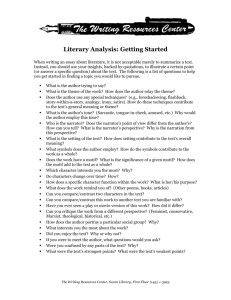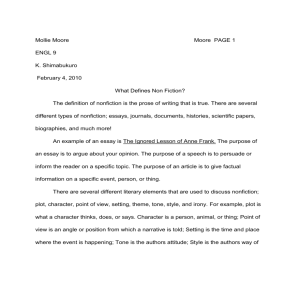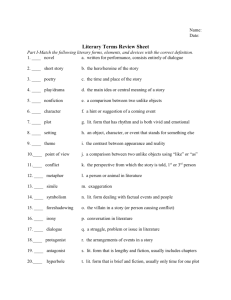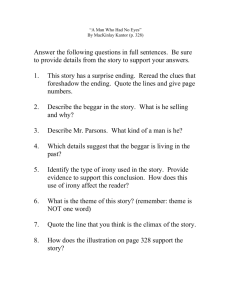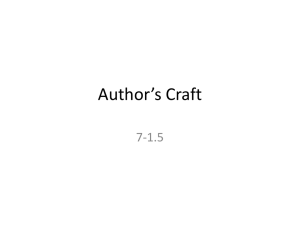POETRY NOTES For 8th Grade
advertisement
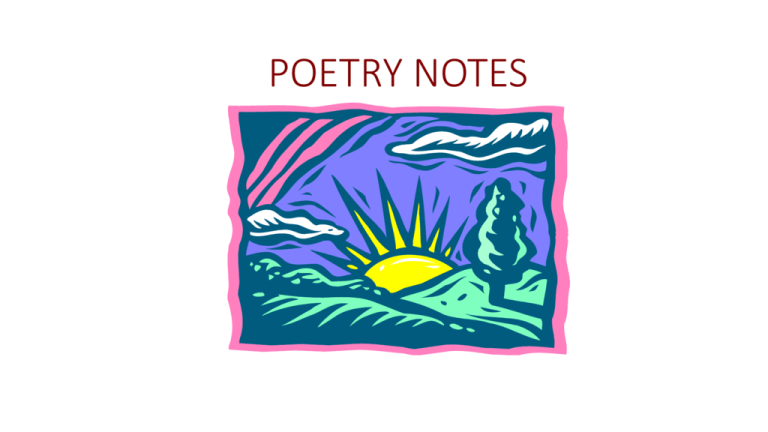
POETRY NOTES How to use the “poetry book” and filling in the table of contents. • Starting from the inside of the cover page, start numbering the pages #1-#26. The inside of the last page should be page #26. • Once that is done, go back to the table of contents page, that’s page one. Table of Contents 1. 2. 3. 4. 5. 6. 7. 8. 9. 10. 11. 12. Table of content What is poetry? Analyzing poetry using S.I.F.T. S.I.F.T. notes cont…. Alliteration Allusion Cliche Cacophony Connotation Denotation Consonance Irony Table of contents continue… 13. Euphemism 14. Hyperbole 15. Metaphor 16. Simile 17. Rhyme 18. Refrain/repetition 19. Motif/Paradox 20. Symbol 21. Theme 22. Tone POETRY is… a type of literature that expresses ideas and feelings, or tells a story in a specific form (usually using lines and stanzas) POETRY SPEAKS TO THE HEART Poetry asks you to feel something (that’s the heart part), not just think about it. You can tell how the poet feels about being alone in the following example: Silence is A friend in times of sorrow When all the amiable chatter in the world Brings no relief -Jennifer Karakka POETRY SPEAKS TO THE SENSES Poets create word pictures that build an image in your mind. Notice how the following example appeals to your sense of sight: As night falls we head for bed, Great-grandma in her velvet, royal blue nightgown, Her silver hair like a moon in a night sky, Her curlers, when the light hits them just right, Sparkling like stars. -Carrie Materi Go to Sift Powerpoint Alliteration When the first sounds in words repeat. Example Peter Piper picked a pickled pepper. Slim-pinioned swallows sweep and pass CARING CATS Caring cats cascade off Laughing lamas Lounging. Underneath yelling yaks, Yelling at roaming Rats. By Rachael http://library.thinkquest.org/J0112392/alliteration.html Rain Rain races, Ripping like wind. Its restless rage Rattles like Rocks ripping through The air. ~By Jake http://library.thinkquest.org/J0112392/alliteration.html ALLUSION • From the verb “allude” which means “to refer to” • A reference to someone or something famous. A tunnel walled and overlaid With dazzling crystal: we had read Of rare Aladdin’s wondrous cave, And to our own his name we gave. -from “Snowbound” by John Greenleaf Whittier That is so Cliché……… • a phrase or expression that has been used so often that it is no longer original or interesting. Cacophony • If we speak literally, cacophony points to a situation where there is a mixture of harsh and inharmonious sounds. In literature, however, the term refers to the use of words with sharp, harsh, hissing and unmelodious sounds primarily those of consonants to achieve desired results. • ‘Twas brillig, and the slithy toves • Did gyre and gimble in the wabe; • All mimsy were the borogoves,an • And the mome raths outgrabe. • “Beware the Jabberwock, my son! • The jaws that bite, the claws that catch! • Beware the Jubjub bird, and shun • The frumious Bandersnatch!” CONNOTATION vs DENOTATION • Connotation: an emotional or social association with a word, giving meaning beyond the literal definition • Denotation: the specific, literal image, idea, concept, or object that a word or phrase refers to Word Denotation Connotation a star ball of light/gas in the sky a wish a family group of related individuals love, trust, closeness a dog four legged mammal friend, protector, pet CONSONANCE • Similar to alliteration EXCEPT: • repeated consonant sounds can be anywhere in the words, not just at the beginning! And frightful a nightfall folded rueful a day …How a lush-kept plush-capped sloe Will, mouthed to flesh-burst, Gush!— - From “The Wreck of the Deutschland” by Gerald Manley Hopkins Examples of Consonance…. • • • • • • • • • • Mike likes his new bike. I will crawl away the ball. He stood on the road and cried. Toss the glass, boss. It will creep and beep while you sleep. He struck a streak of bad luck. When Billie looked at the trailer, she smiled and laughed. I dropped the locket in the thick mud. The black sack is in the back. The zoo was amazing, especially the lizards and chimpanzees. Irony • Definition: the use of words that mean the opposite of what you really think especially in order to be funny. • A situation that is strange or funny because things happen in a way that seems to be the opposite of what you expected. 3 different kinds of Irony • Dramatic Irony. Irony that is inherent in speeches or a situation of a drama and is understood by the audience but not grasped by the characters in the play. • Verbal Irony (Sarcasm)Irony in which a person says or writes one thing and means another, or uses words to convey a meaning that is the opposite of the literal meaning. • Situational Irony (aka Contextual Irony) Situational Irony (aka Contextual Irony) • noun1.irony involving a situation in which actions have an effect that i sopposite from what was intended, so that the outcome is contrary to what was expected. • Romeo and Juliet by William Shakespeare - Romeo finds Juliet drugged and assumes she is dead. He kills himself then she awakens, see that he is dead and kills herself. • Fahrenheit 451 by Ray Bradbury - This book is on the top 100 list of banned books in America. • A fire station burns down • The marriage counselor files for divorce • The police station gets robbed • A fertility counselor has difficulty getting pregnant • Posting on Facebook complaining how useless Facebook is Euphemism • To Soften an Expression • Some euphemisms are used in order to make a blunt or unpleasant truth seem less harsh. • Passed away instead of died • Correctional facility instead of jail • Departed instead of died • Differently-abled instead of handicapped or disabled • Fell off the back of a truck instead of stolen Hyperbole Exaggerating to show strong feeling or effect. Examples I will love you forever. My house is a million miles from here. She’d kill me. Metaphor A metaphor states that something is something or someone else. It is a comparison, but it does not use like or as. “It's raining cats and dogs" Life is a mountain, filled with switchbacks and rock slides and few straight paths to the top Metaphors and Similies I wish I could dream up a meta-phor or five To keep my poems more poetically alive I will always be known as the poet who's hacking If I continue to write poems metaphorically lacking Similarly, since I've similies few My poems can be tasteless as cheeseless fondue Literature in meters, we refer to as verse Lacking metaphors or similies, there's nothing much worse Those figures of speech, though elusively distant Should enter my head if my brain is persistant I'll continue to strive to creatively write Hoping metaphors and similies come into sight A comparison between two usually unrelated things using the word “like” or “as”. Examples: Joe is as hungry as a bear. In the morning, Rae is like an angry lion. By Archibald MacLeish Simile A poem should be palpable and mute as a globed fruit, Silent as the sleeve-worn stone Of casement ledges where the moss has grown— A poem should be wordless As the flight of birds. Simile Let’s see what this looks like in a poem we have never seen before in our lives Simile Ars Poetica The repetition of sounds Example: hat, cat, brat, fat, mat, sat My Beard by Shel Silverstein My beard grows to my toes, I never wears no clothes, I wraps my hair Around my bare, And down the road I goes. Here is another example: http://www.youtube.com/watch?v=oGrcdq2viZg It is also called Refrain. Using the same key word or phrase throughout a poem. This should be fairly selfexplanatory, but . . . at risk of sounding like a broken record . . . Motif and Paradox • Motif: A motif is a narrative element with symbolic meaning that repeats throughout a work of literature. A recurring subject, theme, idea, etc., especially in a literary, artistic, or musical work. • Paradox: a statement or proposition that seems selfcontradictory or absurd but in reality expresses a possible truth. • a self-contradictory and false proposition. • any person, thing, or situation exhibiting an apparently contradictory in nature. • an opinion or statement contrary to commonly accepted opinion. Examples of Motif and Paradox • In his most famous speech, Martin Luther King Jr. used the motif of “I have a dream” to tie together desperate ideas. • Your enemy’s friend is your enemy. • I am nobody. • “What a pity that youth must be wasted on the young.” – George Bernard Shaw • Wise fool • Truth is honey which is bitter. • “I can resist anything but temptation.” – Oscar Wilde Symbols as thematic word choice Symbols are words, ideas etc. used to represent something else or an idea. Symbols are used often in poetry. A word, a phrase or the whole poem could be a symbol. “The Raven” What does that symbolize in the poem? SYMBOLISM • The use of a word or object which represents a deeper meaning than the words themselves • It can be a material object or a written sign used to represent something invisible. I shall be telling this with a sigh Somewhere ages and ages hence: Two roads diverged in a wood, and I— I took the one less traveled by, And that has made all the difference. -from “The Road Not Taken” by Robert Frost What is tone? The attitude with which the speaker or narrator treats his or her subject. • Tone is similar to tone of voice. • The same adjectives can be used to describe the narrator's tone. • You can't hear the narrator, so you have to infer the tone from his or her words. Tone is not Mood Tone: how the narrator or speaker feels about their subject. Mood: how the reader is supposed to feel when reading the work. Mood Reader Narrator Tone Review • Tone and mood are different but related. • Tone describes the narrator's attitude or voice. • Mood is how the reader is supposed to feel. • Ex: A reader can feel scared for a character even if the narrator is indifferent. What is a Theme? Theme: Life lesson, meaning, moral, or message about life or human nature that is communicated by a literary work. In other words… Theme is what the story teaches readers. Themes A theme is not a word, it is a sentence. You don’t have to agree with the theme to identify it. Examples Money can’t buy happiness. Don’t judge people based on the surface. It is better to die free than live under tyranny. What is the theme? Jenny Puchovier was so excited. She had a pack of Starburst in her lunch and she had been looking forward to eating them all morning. Lunch finally came and Jenny sat down to eat her Starbursts when her friend Yudy sat next to her. “Let me get the pink ones,” asked Yudy. Jenny liked the pink ones best, but she thought Yudy was funny and Jenny wanted Yudy to like her, so Jenny gave Yudy all of her pink Starbursts. Before Jenny was done giving Yudy the pink ones, Carrie sat on the other side of Jenny. “Let me get the red and the orange ones, Jenny. Remember when I gave you that Snickers?” Jenny didn’t remember that, though she did remember when Carrie ate a whole Snickers in front of her, but Jenny thought Carrie was cool, so she gave her the red and the orange Starbursts. Now that she only had the yellow ones, Jenny wasn’t so excited about eating starbursts anymore. Example Answers You can’t buy friends. You have to take care of yourself. Not everybody is your friend. Review 1. Theme is what we can learn from a story. 2. Themes must be inferred. 3. Themes are about the BIG world.
